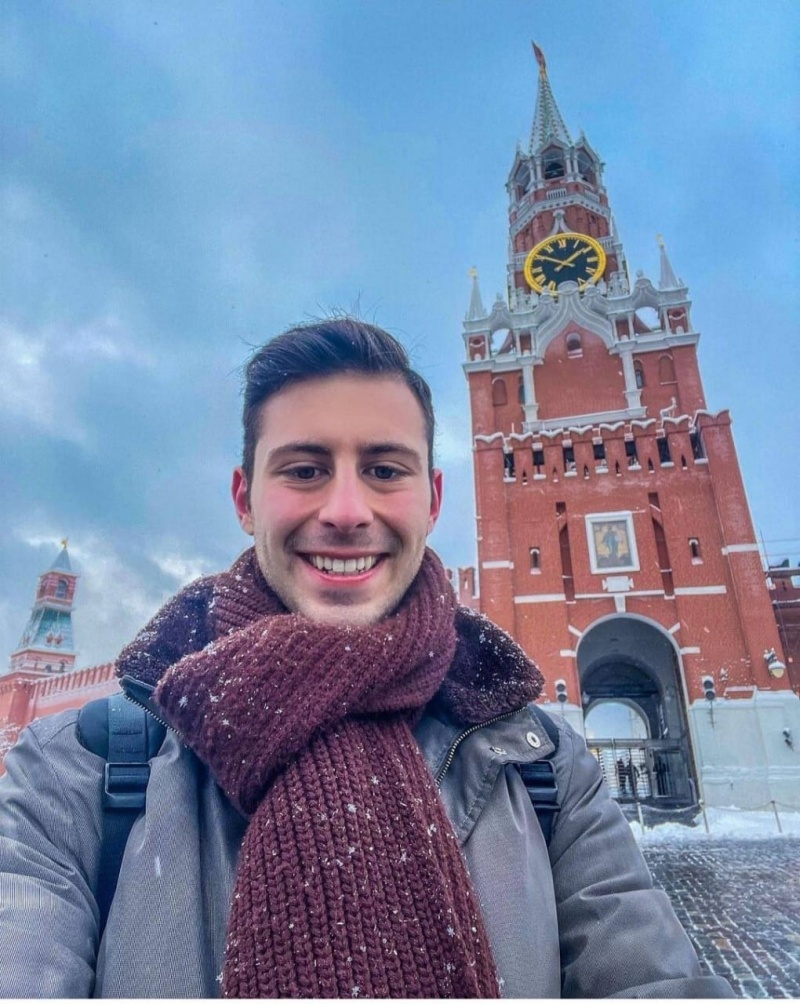By invading Ukraine, Putin has made Russia a dangerous rogue nation, populated by aggressive people, brain-damaged by propaganda, and ruled by a mad maniac who possesses nuclear weapons.
Support for Ukraine by the West and most countries of the world is unanimous. The sanctions imposed on Russia by the civilized part of humanity for its war crimes are unprecedented. But, more importantly, since February 24, 2022, everything connected with Russia is perceived in the world as a threat and as something low and dangerous.
Today, Russia is a deceitful terrorist state scorn of the world community, waging war against the entire Western civilization. The Russians are a zombie people who believe the lies of their rulers and support the crimes of their state.
All this has led to the fact that everything Russian is now treated with distrust and suspicion. All over the world, the expulsion of Russian capital from the markets, the freezing of assets, and other sanctions is increasing. Russian citizens are denied visas, do not open bank accounts, block bank cards, cancel visas and residence permits.
They are not welcome anywhere. They are outcasts everywhere. And they deserve that kind of treatment.
The Western world fully realized the threat to the existence of civilization posed by Moscow and began to take measures to destroy the source of this threat. Among other measures, we saw the mass expulsions of Russian “civilian diplomats” from many countries of the world. Almost daily there are reports of arrests and exposures of Russian agents coming from different countries. Governments and law enforcement agencies around the world have stopped ignoring the subversive work of the Russian special services in their countries. They began to realize the danger posed by the numerous networks of Russian agents of influence operating on their territory, which had been created over decades by the Russian special services.
So far, we see only the first steps to eradicate Russian intelligence networks of influence, such as blocking accounts, revoking licenses, and expelling Russian “diplomats” who oversee organizations of Russian compatriots. But this should not be a reason for complacency. These measures are not enough. And, what is the most important, it is not enough to neutralize the existing networks of Russian intelligence and influence. It is necessary to ensure that Russian intelligence services are deprived of the opportunity to create new networks and reproduce new generations of their agents.
Russian intelligence services have developed an extremely effective toolkit for training and infiltrating their agents in various European structures. Most of these tools remain invisible to Western intelligence agencies, or are not yet fully understood by them.
This article reveals one of the methods for the preparation and infiltration of agents of influence and agents of special services in various structures of the West, used by Russian special services.
On October 5-7, Nicosia hosted the 9th Environment for Europe Ministerial Conference of the UN Economic Commission for Europe (UNECE) under the motto “Transforming the Planet”.
“Sustainable Infrastructure”, “Sustainable Tourism” and “Education for Sustainable Development” are the main themes of the conference in Nicosia. The event was attended by high-level delegations from over 60 countries, including UNECE countries, the Mediterranean region, the Middle East and Asia. In total, about 1000 representatives of the public and private sectors, academia, youth and business, as well as civil society organizations. All of them came to Cyprus to discuss the greening of the economy in the pan-European region, assess the progress of the process and agree on future joint steps.
The conference was held in an atmosphere of unanimous support for Ukraine in its fight against Russian aggression. At the very beginning of the first day of the conference, all delegations and participants greeted the Ukrainian delegation headed by the Minister of Ecology of Ukraine Ruslan Strelets. Only the delegations of Russia and Armenia remained in their seats. The organizers and members of the delegations of all countries, except for the Russian and Armenian ones, expressed their support for Ukraine and expressed their admiration for the courage and resilience of the Ukrainian people.
On the eve of the beginning of the conference, the participants voted for the draft declaration, which was then submitted for consideration by the delegates. There were two questions in the draft declaration that dealt with the consequences of Russia’s military aggression against Ukraine and entailed environmental consequences for the entire European continent. The head of the Russian delegation and part-time head of the Consular Department of the Russian Embassy in the Republic of Cyprus, Denis Borodich, tried to block the adoption of these two paragraphs. All the delegations of the countries participating in the conference, again, except for the Russian and Armenian ones, voted for the inclusion of these paragraphs.
Many important issues were discussed at the conference and many important decisions were made to protect the ecology of Europe.
But the conference was remarkable not only for this.
The organizers of the conference attracted a large number of volunteers as liaison officers and assigned them to each delegation. They helped the delegations solve many organizational issues, acted as interpreters, solved technical and communication problems with delegates from other countries, including ministers, and much more.
As usual in such cases, the volunteers at the conference were young people just starting an independent life. Students and recent university graduates, with the energy and enthusiasm inherent in youth, quickly moved around the meeting room, rushed to fulfill the instructions of the conference participants, swarmed around high-ranking officials and took pictures with everyone they could reach. And selfies, selfies, selfies. Everywhere and always. Each of the volunteers who worked at this event now has an impressive portfolio with interesting people and influential politicians.
Among this swarm of volunteers was one very nice young man with a charming smile and unusually helpful manner. Excellent Greek and very good English allowed him to be irreplaceable for solving many problems that arose. Until the end, it remained unclear to which delegation he was attached, since he presented himself as a liaison officer for various delegations. He spent most of his time fulfilling the instructions of the Georgian delegation; it is likely that he was attached to the Georgian delegation.
Several participants of the conference told the Cyprus Daily News that they witnessed this helpful volunteer introducing himself several times as a member of a delegation from various Baltic countries. Please note: not a liaison officer, but a member of the delegation of one of the EU member countries.
He did this in order to get in touch with representatives of various countries to discuss issues that go far beyond his functional duties. That is, he took part in confidential discussions of those issues to which, according to his status, access was closed.
An eagle-eyed member of the delegation of one Eastern European country told us that this active young man was aware of the negotiations between many delegations and knew about personal meetings between particular participants and what topics they were being discussed. He participated in resolving issues not related to his functional duties as a liaison officer several times.
He skillfully and masterfully changed himself on the go. He was as a liaison officer when it was needed. When he needed to take part in the discussion of issues not related to the terms of his duties, he pretended to be a member of the delegation of one of the Baltic countries, participating in the conference.
Obviously, he had interests that went far beyond volunteer duties.
The tight schedule of the conference, as well as the friendly and open atmosphere that reigned in the Filoxenia Conference Center did not give the majority of delegates the opportunity to take a closer look at the personality of the helpful volunteer, or at least read his name on the badge. Not to mention, to verify the identity of the person with whom they discussed various issues. But should do.
His name is Vladimir Gorin. According to our sources, he volunteered at the conference on the recommendation of the Cyprus Green Party, of which he is an active member.
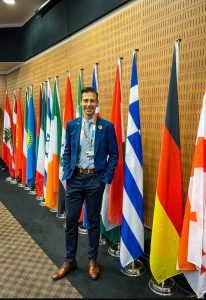
From open sources it is known that he was born in Athens, he is 22 years old.
His mother is Russian, a citizen of Russia and Greece. Father is also a citizen of Russia and Greece, a Pontic Greek by origin. In recent years, Vladimir has been living in the Republic of Cyprus.
Further study of Vladimir Gorin personality in open sources forces us to ask a number of questions to the organizers of the conference and the board of the Green Party:
– how did this person get access to the UN conference in EU territory with the participation of high-ranking EU government officials?
– do the organizers of such events in the Republic of Cyprus check the people involved as volunteers for their links with government agencies of countries under EU sanctions and posing a threat to the security of the EU and the Republic of Cyprus?
-do the Cypriot Greens know about Vladimir’s close ties with the criminal state, which is sanctioned by the EU for war crimes and recognized by the UN as an aggressor?
Apparently, the organizers of the conference and high-ranking functionaries of the Green Party, with whom Vladimir has developed friendly relations, do not want to be bothered. But in vain.
From open sources, you can find out that Vladimir Gorin studied at Russian educational institutions and has close ties with Russia, Russian government agencies and organizations.
He is the “ambassador of the Russian language in the world.” To obtain this status, Vladimir studied in Moscow at the Pushkin Institute under a special program that teaches students that the Russian language is a tool of Russia’s soft power and the most effective weapon for promoting the ideology of the “Russian World” in foreign countries. The program includes a volunteering course, in which students are told how to properly offer themselves as a volunteer to various organizations in Western countries.
He also participates in the “Volunteers of the Victory” Russian government project, under the auspices of the Russian Federal Agency for Youth Affairs (Rosmolodyozh).
Here is what, among other things, is said in the description of this project:
“The All-Russian public movement “Volunteers of the Victory”, with the support of Rospatriotcenter and Rosmolodyozh, announces the recruitment of volunteers to help organize the celebration of Victory Day in the following areas:
Volunteer accompaniment during the Victory Parades and the “Immortal Regiment” people’s procession…;
Participation in St. George’s Ribbon, Victory Day Letter campaign…
Volunteers will provide support for the victory parades and the procession of the Immortal Regiment…
Everything is clear here, the “Volunteers of the Victory” are active propagandists of the “Russian World” and the Russian official version of the history of WWII.
“Rosmolodyozh” is under the taught control of the 2nd service of the FSB. Among the active members of this pseudo-public organization, the 2nd service recruits informers, sometimes for work as agents. In Russia, this is not a secret. Many young people who do not have connections and influential relatives join these organizations with only one goal — to be recruited by the FSB and in the future, if they are lucky, work for this special service. In modern Russia, it is considered the most prestigious.
We have found information that Vladimir is a member of the “Youth Club of Russian Compatriots”. The main goal of such clubs is to promote the ideas of the “Russian World” and ideological influence on young Russian emigrants abroad.
The “Youth Club of Russian Compatriots in the Republic of Cyprus” is a subdivision of the “Coordinating Council of Russian Compatriots Living in the Republic of Cyprus” (KSORS).
Let us remind our readers that it was the KSORS who organized numerous pro-Russian propaganda actions and rallies in support of Russia’s war against Ukraine in the Republic of Cyprus.
KSORS, in turn, is a division of the “World Coordinating Council of Russian Compatriots” created by Putin’s order.
“The World Coordinating Council of Russian Compatriots Living Abroad (VKSRS) was established in 2007. This organization is the executive body of the World Congress of Russian Compatriots (VKRS), which should ensure “interaction of compatriots with the state authorities of the Russian Federation and the state authorities of the constituent entities of the Russian Federation.”
“The Coordinating Councils of Russian Compatriots (KSRS), which are part of it, have been created in 97 countries of the world, they coordinate the activities of many separate cells — all kinds of Russian centers and cultural societies — in each country. Every European country has KSRS, which include from several to dozens of organizations (associations) consisting of former citizens of Russia and the USSR,” explains historian Dmitry Khmelnitsky.
All these organizations are funded by the Russian budget and managed from a single center — the Kremlin.
Everything is clear here, Vladimir Gorin is a member of pseudo-public organizations of Russian emigrants created and funded by the government of the Russian Federation. The Russian government and Russian intelligence services use these pseudo-public organizations as tools of influence, propaganda and espionage abroad.
In addition, Vladimir Gorin is officially employed by the EU-sanctioned Russian government agency, Rossotrudnichestvo. At the Russian House (former RCNK) in Nicosia, which is a structural subdivision and the headquarters of the Rossotrudnichestvo representative office in the Republic of Cyprus, he teaches Robotics to children and is the leader of the “Pioneer” pro-Kremlin children’s movement.
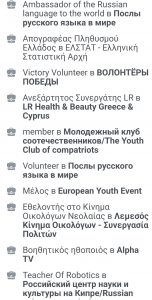
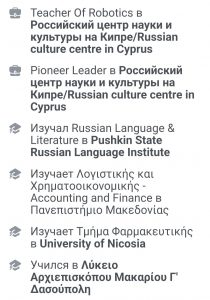
Once again, we draw the attention of readers to the fact that Rossotrudnichestvo has been subject to EU sanctions.
The full name of Rossotrudnichestvo government agency is the “Federal Agency for the Commonwealth of Independent States, Compatriots Living Abroad, and International Humanitarian Cooperation.”
Rossotrudnichestvo was established in 2008, but is the successor to the “All-Union Society for Cultural Relations with Foreign Countries” (VOKS), which existed until 1958, and then changed its name several more times.
In the USSR, relations with foreign countries traditionally was the competence of state security agencies, starting from the Foreign Department of the OGPU in the 1920s. In the post-Soviet era, this situation has not changed, that’s why Rossotrudnichestvo can be considered the FSB institutional organization.
Rossotrudnichestvo has 95 missions abroad, 72 Russian centers of science and culture operate in 62 countries. Besides propaganda work in the emigration, its tasks include attracting foreigners to study in Russia.
“The Agency pays special attention to citizens of foreign countries who wish to receive a Russian education. The annual quota for the education of foreigners is 15,000. The education quota has proven itself as one of the most effective tools of Russian “soft power” in this sphere of international humanitarian cooperation. In 2016 alone, one thousand foreign young leaders from 100 countries visited the Russian Federation under this program,” the Rossotrudnichestvo report for 2016 stated. Everything is clear here — Rossotrudnichestvo is openly engaged in mass recruitment and training of Moscow agents of influence from the younger generation of Russian emigration,” Dmitry Khmelnitsky said.
“Rossotrudnichestvo” has always served as a cover and ensured the work of the Soviet and Russian special services abroad. Working with Russian-Soviet emigration has always been much easier for the Soviet and Russian intelligence services than recruiting “native” foreigners. Among other things, “Rossotrudnichestvo” was created for this purpose too.
Without a doubt, Vladimir Gorin is a representative of a new generation of Russian agents of influence, he comes from a family of Russian immigrants. He is just starting his journey as a Russian agent, but has already achieved great success.
The recruitment of agents of influence for the Soviet special services has been the most important task since the beginning of the 20s. Then the OGPU (later the NKVD, KGB, FSB, SVR) was engaged in mass recruitment of Western politicians, writers, literators, scientists, anyone. The goal is to change Western public opinion in their favor and espionage. Russian emigration in Europe is an extremely favorable environment for the activities of the FSB, SVR, GRU agents. It is infused with them.
“It is virtually impossible to draw a line between the activities of agents of influence and espionage. Suppose an agent of influence has some kind of access to secret information if, for example, he is a politician, or is involved in public activities at a high political level. Or an engineer, for example, an atomic physicist. With the help of such people, the technology for the production of atomic bombs was stolen for Stalin from the Americans. Moreover, but in fact, these people were not spies. They were agents of influence,” Dmitry Khmelnitsky said.
In addition to purely propaganda and recruitment work in the emigrant environment, the tasks of Rossotrudnichestvo include the selection of foreign students for free study at Russian universities, where they are trained as ideological patriots of Russia, propagandists of the Russian World, haters of the West and Western values. In Russian universities, these people are successfully educating new generations of Putinoid patriots.
While studying in Russia, they are recruited by the Russian special services. Back in the days of the USSR, all foreign students became targets for recruitment by state security agencies. In modern Russia, this practice remains unchanged.
Then, after studying in Russia, these people return to their countries and work for the government, banks, media, business, public and religious organizations, etc. Each of them is a valuable source of information for Russian intelligence agencies. All of them became conductors of the will of the Kremlin and agents of Russian influence in their countries. There are a great many examples of this.
The Russian state does not teach anyone for free. In return, it requires complete submission to itself and work in its own interests.
The mechanism of selection and training of such agents is curious.
There are “educational and cultural programs” in all “Russian Houses” (Russian cultural centers), and in the Republic of Cyprus too. With its help, the ideology of the “Russian World” is promoted; the Russian language is promoted according to Moscow programs, which makes it possible to successfully educate new generations of Russian patriots in foreign countries.
For this purpose, numerous Russian language courses, ballet schools and dance studios, clubs, art, theater and music studios have been created at Russian Houses.
There are positions of specialists in higher education in Russia in all “Russian Houses” (Russian cultural centers), including in the Republic of Cyprus. As a rule, there serves modest, inconspicuous employees of Rossotrudnichestvo.
Specialists in higher education in Russia in Russian cultural centers around the world are working on the selection and preparation of candidates for study in Russia. In “Russian Houses” there are commissions for the selection of future foreign students for free study in Russia. Once a year, this commission decides which of the children of “citizens of other countries” to send to Russia for “study”. Particular preference is given to children from families of Russian emigrants. There are quotas for each country. For Cyprus, it is 12 people.
The work of the commission and its decisions is fiction — specialists in higher education decide everything.
In all world countries where “Russian Houses” operate, including the Republic of Cyprus, the modest position of a specialist in higher education in Russia is assigned to the Foreign Intelligence Service of the Russian Federation, the successor of the USSR First Main Directorate of the KGB.
Officers of the SVR, working under the guise of specialists in higher education in Russia in the “Russian Houses”, engaged in espionage in host countries. In addition to numerous official duties, they are responsible for the preparation and selection of “promising children” for study in Russia.
With the help of various projects, educational programs, clubs and studios, they seek to attract the largest possible number of children and young people to the sphere of influence of the “Russian Houses” and Russian youth pseudo-public emigrant organizations. There they closely monitor future candidates and work with them.
First of all, attention is paid to the origin of the parents:
– Are there any immigrants from the USSR and Russia among them and what political views do they hold?
– Did they inspire love their child for Russia?
— Does the family watch Russian TV?
— How to evaluate the events taking place in the world and much more?
Only after that, the intellectual abilities of candidates, academic success and suggestibility are evaluated.
According to our sources, who have worked for a long time at the “Russia House” in Nicosia, Vladimir Gorin owes his career as an agent of influence of Russia, apparently also an agent of the Russian special services, an active propagandist of the Russian World in the Republic of Cyprus to Major of the RF Foreign Intelligence Service Igor Melnik.
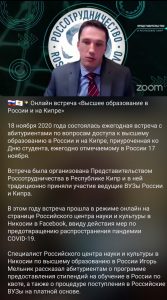
Igor Melnik worked for several years in the Republic of Cyprus under the guise of a specialist in higher education in Russia at the RCNK in Nicosia. The special services of several Western countries have identified him as a staff member of the Foreign Intelligence Service of the Russian Federation.
According to our source at the “Russia House”, Vladimir Gorin, in conversations with his relatives, did not hide the fact that he was working in the interests of the Foreign Intelligence Service and was very proud of it.
According to the same source, Vladimir Gorin often visits the Russian embassy in Nicosia. He has many friends and mentors there with whom he maintains a very close relationship. One of them, Denis Borodich, head of the Consular Department of the Russian Embassy in the Republic of Cyprus. Vladimir often communicates with him, puts hearts under his Facebook posts. Some of our sources claim that Denis Borodich is actually a staff member of the Foreign Intelligence Service of the Russian Federation working under diplomatic cover. Cyprus Daily News is not yet able to confirm or deny this information.
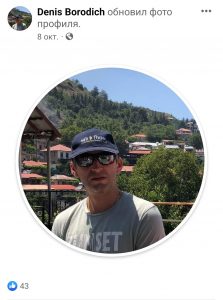
We remind our readers that Denis Borodich was the head of the Russian delegation at the UN conference in Nicosia, where Vladimir Gorin worked as a volunteer.
Vladimir Gorin is currently studying at the University of Nicosia, and does it well.
He is also an activist of the Cyprus Green Party, which is not surprising, since, according to the apt remark of one Western politician: the Greens are the immature Reds. Pro-Russian sentiments are strong in this party.
According to our information and judging by the social networks of Vladimir, he has many friends among high-level functionaries of this party. Among them there are people working in the parliament and government structures of the Republic of Cyprus.
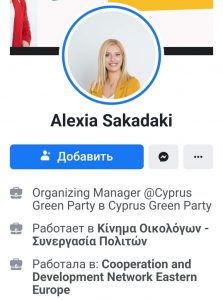
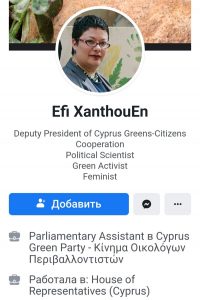
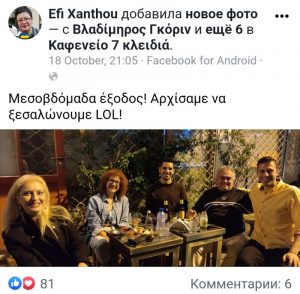
Vladimir’s close ties with the Green Party and friendly relations with influential people is a classic example of the infiltration of Russian intelligence agents into Western political, scientific, business, social and religious circles. If earlier in Soviet times they had to be sent with all precautions to Western countries, invent a legend for them, supply them with false documents, now Russian intelligence simply throws them into Western political parties, universities, public organizations, the media, religious organizations and companies, like a cuckoo egg in other nests. It is terrible to imagine how many of them have been grown in 30 years. And how many of them now, in the West, carry out local political, scientific, business, social and religious activities.
How sensitive to the security of the Republic of Cyprus is the information that high-ranking members of the Green Party share with a young eco-activist with Russian roots is an open question.
Boris Demash, specially for Cyprus Daily News
Articles on topic:
- Dancing with a tambourine in Nicosia
- The FSB conference in Cyprus – four Generals in the first row beside agents
- 4СI and Russian «chameleon» that sheds his skin
- Academics` BEST FRIEND
- “Operation Party”
- «Operation Party 2»
You can support us through Revolut
number +35799820609 or PayPal
Thanks for your support!

